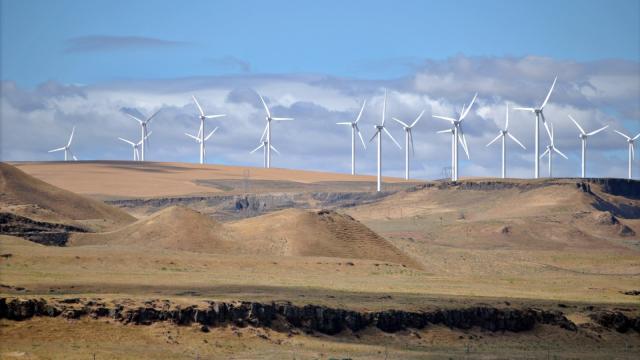
53 million people living in what would be the world’s fifth-largest economy will now be participating in a “far-reaching strategic alignment to combat climate change and promote clean energy.”
On Monday afternoon in San Francisco, the leaders of California, Oregon, Washington, and British Columbia signaled they would not wait for the United States Congress or the Canadian Parliament to act to seriously address climate change. California Governor Jerry Brown, Oregon Governor John Kitzhaber, Washington Governor Jay Inslee, and (via teleconference) British Columbia’s Premier Christy Clark signed the Pacific Coast Action Plan on Climate and Energy.
The agreement is not legally binding and appropriates no money. The plan says it “is intended to spur finding new, smart ways for our governments, agencies and staff to work together,” by doing things like adding value and efficiency to climate initiatives through collaboration, while reducing “overlap and duplication of effort.” So what does it do?
The Action Plan that California, Oregon, Washington, and British Columbia’s leaders all signed agreed to:
1.Account for the cost of carbon, by linking existing carbon pricing programs and working to develop them in Oregon and Washington.
Oregon agreed to “build on existing programs to set a price on carbon emissions,” while Washington would “set binding limits on carbon emissions and deploy market mechanisms to meet those limits.” That sounds like a carbon price and a cap-and-trade system, respectively. California has a cap-and-trade system which has sold out of all its allowances in each of the four auctions it’s held. British Columbia has had a carbon tax for five years, currently at $30/ton (Canadian).
If Oregon and Washington’s plans pass and the programs successfully link, a larger market for the region’s carbon allowances would be a boon for business and economic efficiency. All four leaders said they would try to “harmonize” their greenhouse gas emissions targets for 2050 by developing mid-term targets. Washington already has a 2035 target, and the rest of the states will examine if this works for them. All states will establish the more long-term 2050 targets.
2.Implement low-carbon fuel standards in each jurisdiction, meaning again that California and British Columbia will maintain their standard and Washington and Oregon will move to implement them. Each jurisdiction hopes to merge the standards into an integrated West Coast market “that keeps energy dollars in the region, creates economic development opportunities for regional fuel production, and ensures predictability and consistency in the market.”
The Action Plan agrees to work toward having 10 percent of all new vehicle purchases in public and private fleets be zero-emissions models by 2016. It also signaled support for high-speed rail infrastructure and innovation, as well as accelerating investment in other alternative fuels across the transportation section.
3.Embrace clean energy in a number of different ways. The four jurisdictions said they would promote ease of access to energy-efficient buildings, ensure climate-smart infrastructure investment, streamline approval for renewable energy projects, and work to expand the regional electric grids. Each state will also support EPA regulation of greenhouse gases from power plants, emphasizing the value of allowing state flexibility.
If they can do this, it will be an important part of getting the U.S., Canada, and the globe the right policy environment to create jobs and cut carbon pollution.
The three states and British Columbia make up a combined GDP of $2.8 trillion, which would make it the world’s 5th-largest economy. “The scientific community no longer disputes that climate change is happening and human-caused,” said Oregon Governor Kitzhaber. “But regardless of where you stand on this question, there’s another good reason to act: transitioning to a clean economy creates jobs.”
At the event, leaders from businesses like construction company Skanska USA, Cisco Systems, and Taylor Shellfish Farms spoke about how business was doing well as their state governments moved to tackle climate change.
The signatories agreed to “where appropriate and feasible, link programs to create consistency and predictability” to account for and reduce carbon pollution across the four jurisdictions. With an eye toward a global agreement in 2015, these heads of state saw commitments to reduce their own carbon emissions as a signal to national and sub-national governments that such an agreement was essential.
The Pacific Coast Collaborative was established in 2008 among the four signatory governments plus Alaska (which did not sign the Action Plan) to help them collaborate on challenges facing the North American West Coast — among them, emergency management, clean energy, and economic growth.
Ocean acidification, for example, affects everyone. But it particularly threatens the economies of coastal states. The Action Plan calls for the American and Canadian governments to work to research and monitor ocean acidification to “understand its causes and impacts.”
The Western Climate Initiative was a regional cap-and-trade agreement in 2007 between between California, Arizona, New Mexico, Utah, Montana, Oregon, Washington, and four Canadian provinces. It had been scheduled to go into effect in 2012, but with themidterm elections in the few years preceding the deadline that resulted in the losses of climate hawks, California’s AB 32 and British Columbia’s carbon tax were essentially the only two programs left standing when the dust cleared.
This new agreement could mean that efforts like this to lower carbon emissions are alive and well, depending on how each government implements the plan.
3 WAYS TO SHOW YOUR SUPPORT
- Log in to post comments
















